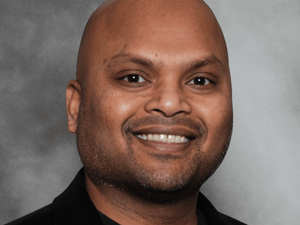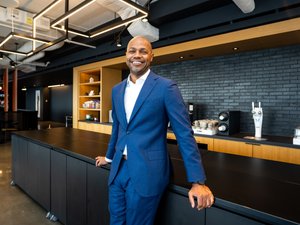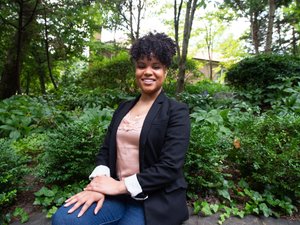![The State of [Black] Venture panel BLCK VC](https://media.bizj.us/view/img/12553639/screenshot-2023-07-11-at-33645-am*540xx1974-1110-0-105.png)
When Maurice Boissiere, general partner at Fulton’s DataTribe, hosted a 2020 webinar on how to score venture capital funding in Greater Washington, he only knew two Black VCs in the area. Six Black VCs showed up to the webinar, and those six became the founding members of the local chapter of an organization called BLCK VC. Today, Boissiere says he knows 130 Black people in or around venture capital in the region.
BLCK VC is the brainchild of Silicon Valley investors Frederik Groce and Sydney Sykes. They looked around venture capital tables in 2018 and found themselves as the lone Black faces. BLCK VC was made not only to build a sense of community in the venture capital space but also to double the number of Black check writers in areas where it has chapters. By increasing Black check writers, the group aims to eliminate an investor bias that results in diverse teams raising 33% less money on average than all-white teams, according to a recent report from DocSend.
The D.C. chapter was founded in 2020, amid the pandemic, by Boissiere; Melissa Bradley, founder and managing partner of D.C.’s 1863 Ventures; Phil Bronner, co-founder and managing partner of Ardent Venture Partners; Jeff Cherry, managing general partner of Baltimore's Conscious Venture Partners; McKeever Conwell, founder and managing partner RareBreed Ventures, Ollen Douglass, former managing partner at Motley Fool Ventures; and David Hall, managing partner Revolution’s Rise of the Rest Fund.
The chapter's DMV BLCK VC Summit, held last month, was the culmination of years of community building among Black venture capitalists and the first in-person programming for the chapter that wasn’t a happy hour. Outside of gathering a community of Black venture capitalists, the chapter, through the national organization, runs programs called Breaking Into Venture and Black Venture Institute that act as a pipeline for Black professionals get VC careers.
The inaugural summit included 170 participants discussing the state of Black venture capital in the region and country at large. The verdict was progress had been made following the 2020 summer of unrest following the murders of George Floyd and Breonna Taylor, but there’s still more work to be done.
“We had parties and stuff like that, but it was time we bring the community together and have some substantive dialogue about the work of venture,” said Boissiere, an advisory board member of the D.C. chapter, whose DataTribe is a “startup foundry” that mixes an accelerator with investment firm.
The summit was designed to speak to people at various levels of the industry. For young professionals, it answered questions on how to break into the field. For experienced VC industry professionals, it focused on ways to take the next step in their careers with panels on branding and how to raise a first and second fund.
Boissiere estimates of the 170 attendees, about 60 worked at an investment institution or venture capital firm. “I think the biggest takeaway was, who knew there were so many Black people in or around venture capital in the DMV?” said Boissiere.
Back in 2018, D.C. tied with Atlanta for the No. 1 city where Black people are doing the best economically, according to Forbes. Old data for sure, but it shows that there’s a legacy of Black wealth in the region. The local BLCK VC chapter boasts stats that there are $1.6 billion in assets under management at funds with a Black general partner in the region and $77 billion assets under management at funds with a Black investment professional.
Bradley, founder and managing partner of D.C.’s 1863 Ventures and fellow advisory board member of the local chapter, has been in venture capital since 1999. She said she has seen strides made and is optimistic about the future — but she also knows some funds won’t make it.
“And that's not a bad thing. I think a lot of funds start and don't continue,” Bradley said. “But I always fear that if we make a mistake, it's like the end of the world.” She worries about a backlash that will see less investment for Black founders as the market tightens and interest rates rise.
The truth of whether Black venture capital will continue to grow hinges on if the broader venture market continues to invest in Black founders, Black funds and hires Black general and managing partners.
Locally, Bradley is not as worried about a lack of investment in Black founders because of diversity-focused programs like TEDCO’s social impact funds, Virginia Founders Fund and D.C.’s Inclusive Innovation Equity Impact Fund. Her 1863 Ventures runs that latter fund for the District.
She is also aware of pushback facing programs like these that support underrepresented founders in lawsuits like the one from Tridentis LLC that killed Alexandria’s small business grant program for entrepreneurs who are Black, Indigenous and people of color, as well as the lawsuit that ended affirmative action's use in college admissions.
“I'm hypersensitive going forward of the risk tolerance of legislators to figure out how to make it work,” Bradley said. “I think it will be up to each respective jurisdiction to decide how important it is economically to support historically marginalized founders. And does that risk of not supporting them economically outweigh whatever the potential backlash may be?”
The local BLCK VC chapter plans to do the summit every year around Juneteenth and continue to discuss ways to move the needle forward for Black venture capital and reach the dream of an all-Black cap table.
“[We’re] not saying Black people don't have biases, but we don't have a bias about skin color,” said Boissiere.




